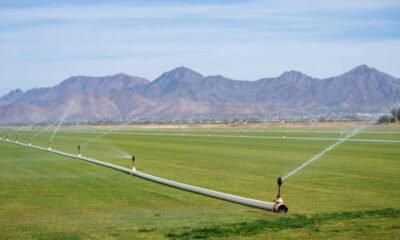Ag-to-Urban
Proposed ‘Ag-to-Urban’ Water Initiatives Might Drive Farmland Sales for Housing Expansion

The Arizona Department of Water Resources is advancing the development of its “Ag-to-Urban” program, which will empower farmers to sell agricultural land for housing development. This initiative is part of an informal stakeholder process aimed at addressing the state’s housing shortage and groundwater depletion.
The proposal has gained traction as it emerges that single-family homes typically consume less water than agricultural land. Proponents argue that converting farmland into residential areas could alleviate housing shortages, stabilize home prices, and conserve vital water resources.
Currently, twin bills, SB1611 and HB2298, are progressing through the legislative process, also allowing for farmland development. Unlike these bills, the Department of Water Resources’ framework will be established through a rulemaking process independent of legislative approval.
Focused on Active Management Areas (AMAs) in Phoenix and Pinal counties, the legislative bills will marginally extend to include the Tucson AMA. The department unveiled a draft of the proposal at a recent stakeholder meeting, emphasizing the need for careful policy formulation.
“We want to ensure we get the policy right,” said Natalie Mast, the active management areas director. “It’s crucial that we engage in thorough discussions to finalize an effective outcome.”
The proposed program aims to ensure that new water uses on retired agricultural lands are supplied by designated water providers and will implement various conservation measures. A 10-year sunset review is also part of the program, with the option for extensions.
Farmers will have their land evaluated before eligibility, focusing on irrigation rights within AMAs. Approximately 28,500 acres in the Phoenix AMA and 104,600 acres in the Pinal AMA qualify for the Ag-to-Urban program. Based on current densities, these areas could accommodate 3.9 housing units per acre in Phoenix and 3.1 in Pinal.
Shope’s legislation outlines stipulations for groundwater use and replenishment but does not incorporate the department’s conservation requirements or designated water provider mandates. As of now, the Senate bill awaits consideration in the Senate Committee of the Whole, while its House counterpart, sponsored by Rep. Gail Griffin, has passed the House Committee and is pending a final vote.
“We find ourselves in a unique position with both bills in play,” Shope remarked. “The timeline is somewhat unclear.” He also noted ongoing negotiations to blend features from both the Senate bill and the Department of Water Resources’ proposal, advocating for a collaborative approach to refine the legislation before reaching the governor’s desk. “This isn’t a sprint; it’s a marathon,” he concluded.


















